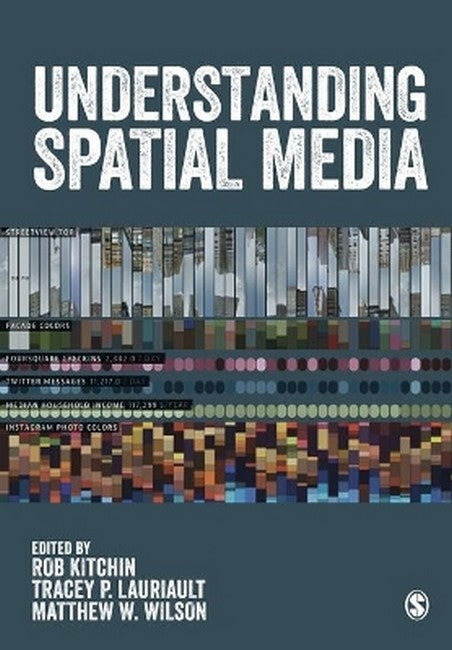Rob Kitchin is a Professor in Maynooth University Social Sciences Institute and Department of Geography. He was a European Research Council Advanced Investigator on the Programmable City project (2013-2018) and a principal investigator on the Building City Dashboards project (2016-2020) and for the Digital Repository of Ireland (2009-2017). He is the (co)author or (co)editor of 31 other academic books, and (co)author of over 200 articles and book chapters. He has been an editor of Dialogues in Human Geography, Progress in Human Geography and Social and Cultural Geography, and was the co-Editor-in-Chief of the International Encyclopedia of Human Geography. He was the 2013 recipient of the Royal Irish Academy's Gold Medal for the Social Sciences. Tracey P. Lauriault is a Programmable City project postdoctoral researcher focussing on how digital data are generated and processed about cities and their citizens. She is actively engaged in research on open data, big data, indicators, and spatial data infrastructures and she has just become a Silicon Republic top 100 women in Science, Technology, Engineering and Math. She is a member of the international Research Data Alliance Legal (RDA) Interoperability Working Group, the Canadian Roundtable on Geomatics Legal and Policy Interest Group, and the advisory board of the Dublin City Council Homelessness Data Task Force. At the Geomatics and Cartographic Research Centre, in Canada, she investigated data, infrastructures and geographical imaginations, the preservation of and access geomatics data; legal and policy issues associated with geospatial, administrative and civil society data; olfactory cartography; and cybercartography. She was the managing editor of Cybercartography: Theory and Practice, and co-editor of Developments in the Theory and Practice of Cybercartography. With the International Research on Permanent Authentic 8 Records in Electronic Systems (InterPARES 2 Project) based at the University of British Columbia she investigated issues pertaining to the accuracy, reliability and authenticity of scientific data, data portals, and led the Cybercartographic Atlas of Antarctica Case Study. As a consultant she advises the Federal Government of Canada on topics pertaining to the long term preservation of geospatial data. She has also helped numerous non-profit organizations build indicator projects, develop community based data consortia, community mapping and open data strategies. Matthew W. Wilson is an assistant professor in the Department of Geography at the University of Kentucky and a visiting scholar at the Center for Geographic Analysis at Harvard University. He co-founded and co-directs the New Mappings Collaboratory which studies and facilitates new engagements with geographic representation. His research in critical GIS draws upon STS and urban political geography to understand the development and proliferation of location-based technologies, with particular attention to the consumer electronic sector. He has previously taught at the Harvard Graduate School of Design, and his current research project focuses on the founding of the Laboratory for Computer Graphics at Harvard in 1965, a catalyzing moment in the advent of the digital map. His work has been published in leading journals and collections including, Society & Space, Landscape & Urban Planning, Geoforum, The Professional Geographer, Annals of the Association of American Geographers, Cartographica, Social & Cultural Geography, Gender, Place & Culture, and Environment & Planning A.
Request Academic Copy
Please copy the ISBN for submitting review copy form
Description
Understanding spatial media - Rob Kitchin, Tracey P. Lauriault and Matthew W. Wilson Part 1: Spatial media technologies GIS - Britta Ricker Digital Mapping - Jeremy Crampton Digitally augmented geographies - Mark Graham Locative and sousveillant media - Jim Thatcher Social Media - Jessa Lingel Urban dashboards - Shannon Mattern Geodesign - Stephen Ervin Part 2: Spatial data and spatial media Open spatial data - Tracey P. Lauriault Geospatial big data - Dan Sui Indicators, benchmarks and urban informatics - Rob Kitchin, Gavin McArdle & Tracey P. Lauriault Volunteered Geographic Information and Citizen Science - Muki Haklay Geo-Semantic Web - Peter Pulsifer and Glenn Brauen Spatial data analytics - Harvey Miller Legal rights and spatial media - Teresa Scassa Part 3: The consequences of spatial media Spatial knowledge and behaviour - Leighton Evans and Sung-Yueh Perng Leveraging finance and producing capital - Rob Kitchin Openness, transparency, participation - Tracey P. Lauriault and Mary Francoli Producing smart cities - Mike Batty Surveillance and control - Francisco Klauser and Sarah Widmer Spatial profiling, sorting and prediction - David Murakami Wood Geoprivacy - Agnieszka Leszczynski

